7 Write a client program in C that uses the Stack abstract d
7. Write a client program (in C++) that uses the Stack abstract data type to compile a simple arithmetic expression without parentheses. For example, the expression
a + b * c - d
should be compiled according to the following table
Operator Operand1 Operand2 Result
* b c z
+ a z y
- y d x
Below you\'ll see the code that I have but it wont\'t compile due to some errors it has
-------------------------------------------------------------------------------------------------------------------------------------------------
#include <stdio.h>
#include <conio.h>
#include <stdlib.h>
#include <math.h>
#define MAX 10
struct opndstack
{
int top;
double items[MAX];
};
struct optrstack
{
int top;
char items[MAX];
};
void pushopnd(struct opndstack *s,double val)
{
if(s->top==MAX-1)
{
printf(“nStack Overflow.”);
exit(1);
}
else
{s->items[++(s->top)]=val;
}
}
double popopnd(struct opndstack *s)
{
if(s->top==-1)
{
printf(“nStack Underflow.”);
exit(1);
}
else
{
return(s->items[(s->top)–]);
}
}
void pushoptr(struct optrstack *s,char ch)
{
if(s->top==MAX-1)
{
printf(“nStack Overflow.”);
exit(1);
}
else
{s->items[++(s->top)]=ch;
}
}
char popoptr(struct optrstack *s)
{
if(s->top==-1)
{
printf(“nStack Underflow.”);
exit(1);
}
else
{
return(s->items[(s->top)–]);
}
}
int isdigit(char ch)
{return(ch>=’0 && ch<=’9);
}
int isoperator(char ch)
{
switch(ch)
{
case ‘+\':
case ‘-‘:
case ‘*\':
case ‘/\':
case ‘^\':
return 1;
default:
return 0;
}
}
double eval(char ch,double opnd1,double opnd2)
{
switch(ch)
{
case ‘+\':return(opnd1+opnd2);
case ‘-‘:return(opnd1-opnd2);
case ‘*\':return(opnd1*opnd2);
case ‘/\':return(opnd1/opnd2);
case ‘^\':return(pow(opnd1,opnd2));
default:printf(“nInvalid operator.”);
exit(1);
}
}
int precedence(char ch)
{
switch(ch)
{
case ‘#\': return 0;
case ‘*\':
case ‘/‘: return 1;
case ‘+\':
case ‘-\':return 2;
case ‘^\':return 3;
case ‘(‘:return 4;
default :printf(\"Invalid operator\");
exit(1);
}
}
double infix(char str[])
{
double opnd1,opnd2,value;
char ch;
opndstack opndstk;
optrstack optrstk;
opndstk.top=-1;
optrstk.top=-1;
pushoptr(&optrstk,\'#\');
int i=0;
char optr2;
for(i=0;str[i]!=\'#\';i++)
{
if(isdigit(str[i]))
pushopnd(&opndstk,(double)(str[i]-‘0));
else if(isoperator(str[i]))
{optr2=popoptr(&optrstk);
if(precedence(str[i])>precedence(optr2))
{pushoptr(&optrstk,optr2);
pushoptr(&optrstk,str[i]);
}
else
{
while(precedence(str[i])<=precedence(optr2))
{ opnd2=popopnd(&opndstk);
opnd1=popopnd(&opndstk);
value = eval(optr2,opnd1,opnd2);
pushopnd(&opndstk,value);
optr2=popoptr(&optrstk);
}
pushoptr(&optrstk,optr2);
pushoptr(&optrstk,str[i]);
}
}
}
while((ch=popoptr(&optrstk))!=’#’)
{
opnd2=popopnd(&opndstk);
opnd1=popopnd(&opndstk);
value=eval(ch,opnd1,opnd2);
pushopnd(&opndstk,value);
}
return(popopnd(&opndstk));
}
void main()
{
char str[80];
int i;
clrscr();
printf(\"Enter an string\");
for(i=0;(str[i]=getchar())!=’n\';i++);
str[i]=\'#\';
printf(“nInfix String = %s”,str);
printf(“nEvaluation= %f”,infix(str));
getch();
}
Solution
#include <stdio.h>
//#include <conio.h>
#include <stdlib.h>
#include <math.h>
#define MAX 10
struct opndstack
{
int top;
double items[MAX];
};
struct optrstack
{
int top;
char items[MAX];
};
void pushopnd(struct opndstack *s,double val)
{
if(s->top==MAX-1)
{
printf(\"\ Stack Overflow.\");
exit(1);
}
else
{
s->items[++(s->top)]=val;
}
}
double popopnd(struct opndstack *s)
{
if(s->top==-1)
{
printf(\"\ Stack Underflow.\");
exit(1);
}
else
{
return(s->items[(s->top)]);
}
}
void pushoptr(struct optrstack *s,char ch)
{
if(s->top==MAX-1)
{
printf(\"\ Stack Overflow.\");
exit(1);
}
else
{
s->items[++(s->top)]=ch;
}
}
char popoptr(struct optrstack *s)
{
if(s->top==-1)
{
printf(\"\ Stack Underflow.\");
exit(1);
}
else
{
return(s->items[(s->top)]);
}
}
int isdigit(char ch)
{
return(ch>=\'0\' && ch<=\'9\');
}
int isoperator(char ch)
{
switch(ch)
{
case \'+\':
case \'-\':
case \'*\':
case \'/\':
case \'^\':
return 1;
default:
return 0;
}
}
double eval(char ch,double opnd1,double opnd2)
{
switch(ch)
{
case \'+\':return(opnd1+opnd2);
case \'-\':return(opnd1-opnd2);
case \'*\':return(opnd1*opnd2);
case \'/\':return(opnd1/opnd2);
case \'^\':return(pow(opnd1,opnd2));
default:
printf(\"\ Invalid operator.\");
exit(1);
}
}
int precedence(char ch)
{
switch(ch)
{
case \'#\': return 0;
case \'*\':
case \'/\': return 1;
case \'+\':
case \'-\':return 2;
case \'^\':return 3;
case \'(\':return 4;
default :printf(\"Invalid operator\");
exit(1);
}
}
double infix(char str[])
{
double opnd1,opnd2,value;
char ch;
opndstack opndstk;
optrstack optrstk;
opndstk.top=-1;
optrstk.top=-1;
pushoptr(&optrstk,\'#\');
int i=0;
char optr2;
for(i=0;str[i]!=\'#\';i++)
{
if(isdigit(str[i]))
pushopnd(&opndstk,(double)(str[i]-\'0\'));
else if(isoperator(str[i]))
{
optr2=popoptr(&optrstk);
if(precedence(str[i])>precedence(optr2))
{
pushoptr(&optrstk,optr2);
pushoptr(&optrstk,str[i]);
}
else
{
while(precedence(str[i])<=precedence(optr2))
{
opnd2=popopnd(&opndstk);
opnd1=popopnd(&opndstk);
value = eval(optr2,opnd1,opnd2);
pushopnd(&opndstk,value);
optr2=popoptr(&optrstk);
}
pushoptr(&optrstk,optr2);
pushoptr(&optrstk,str[i]);
}
}
}
while((ch=popoptr(&optrstk))!=\'#\')
{
opnd2=popopnd(&opndstk);
opnd1=popopnd(&opndstk);
value=eval(ch,opnd1,opnd2);
pushopnd(&opndstk,value);
}
return(popopnd(&opndstk));
}
int main()
{
char str[80];
int i;
// clrscr();
printf(\"Enter an string\");
for(i=0;(str[i]=getchar())!=\'\ \';i++);
str[i]=\'#\';
printf(\"\ Infix String = %s\",str);
printf(\"\ Evaluation= %f\",infix(str));
// getch();
return 0;
}
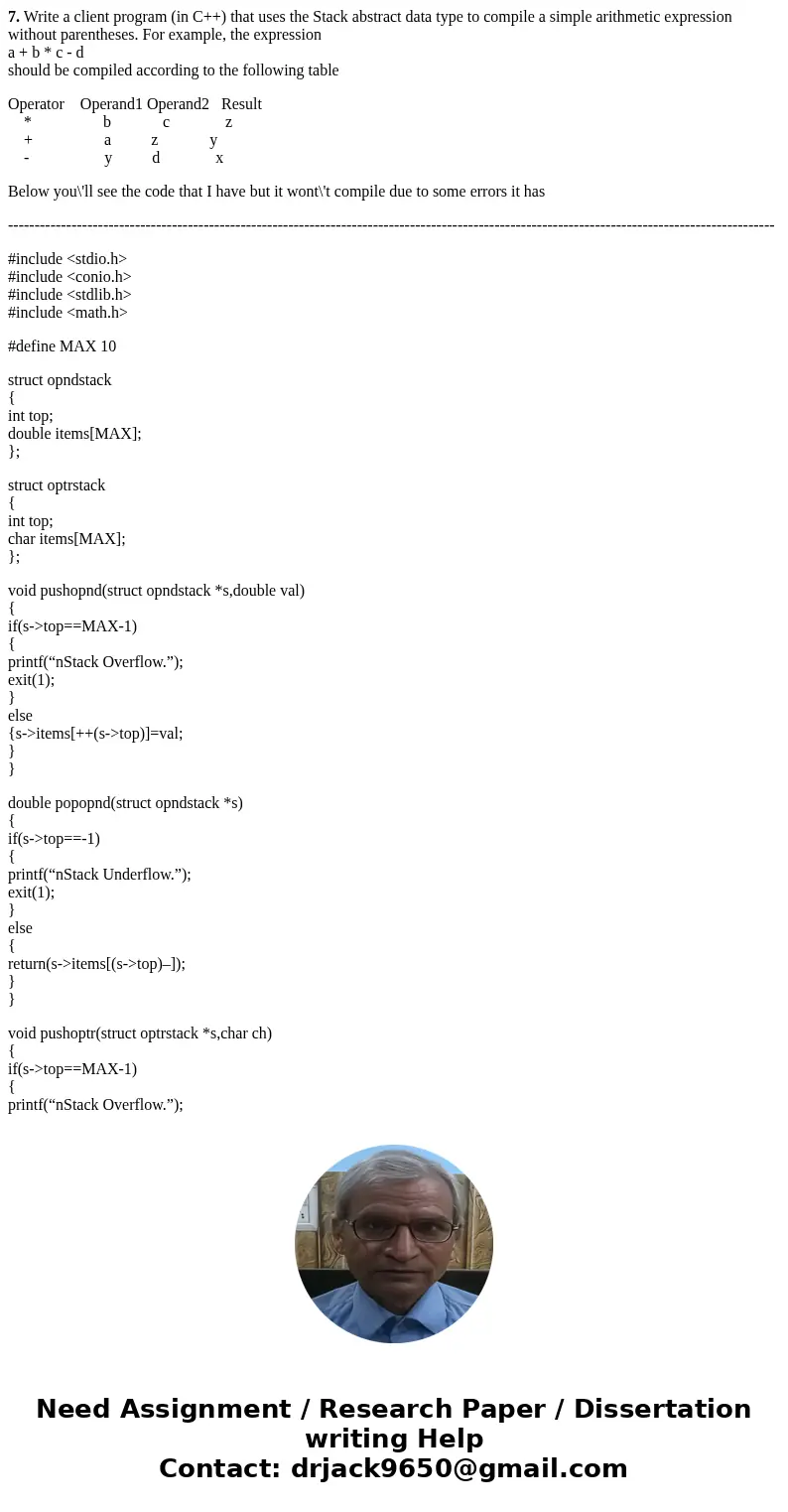
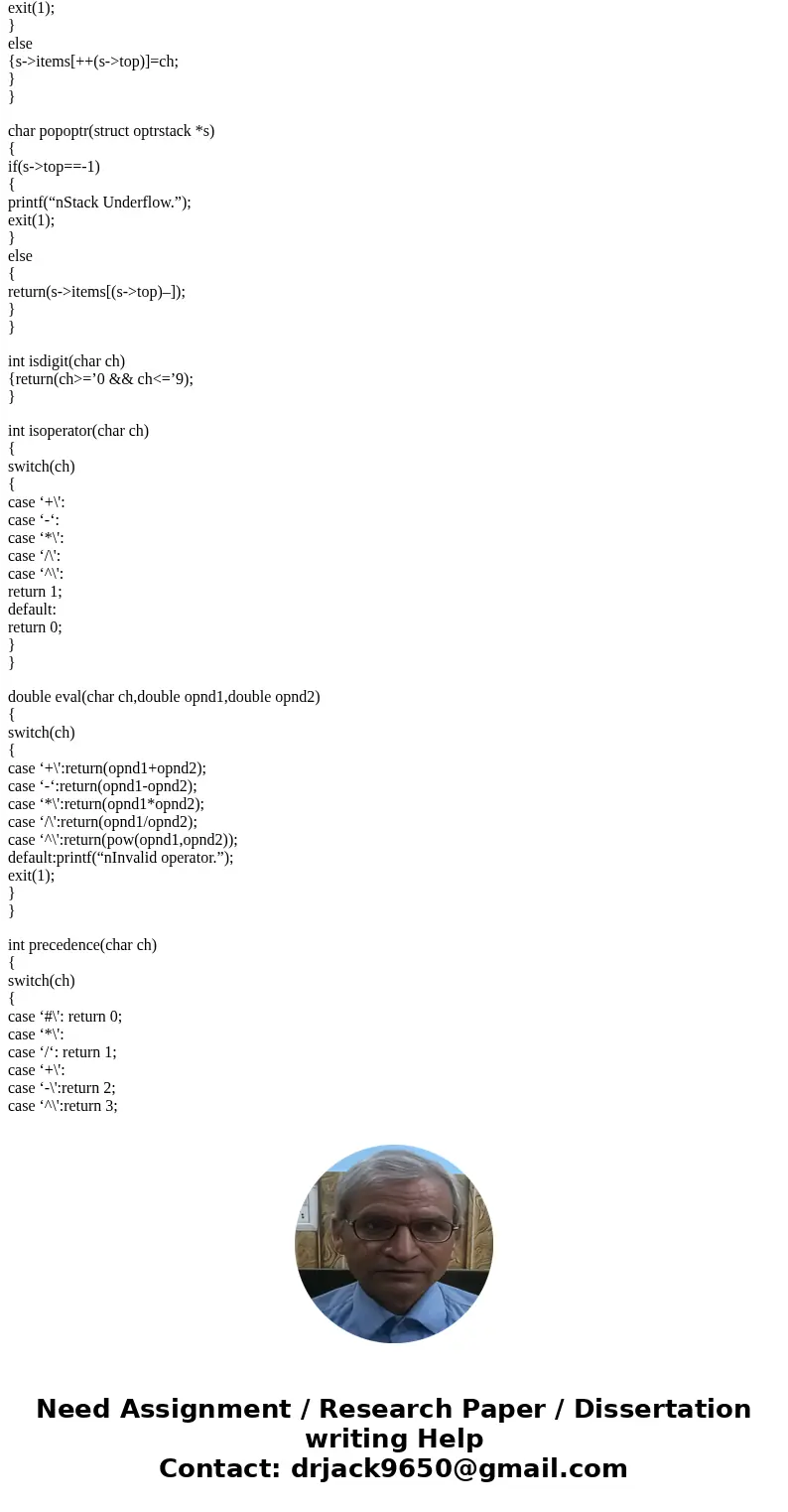
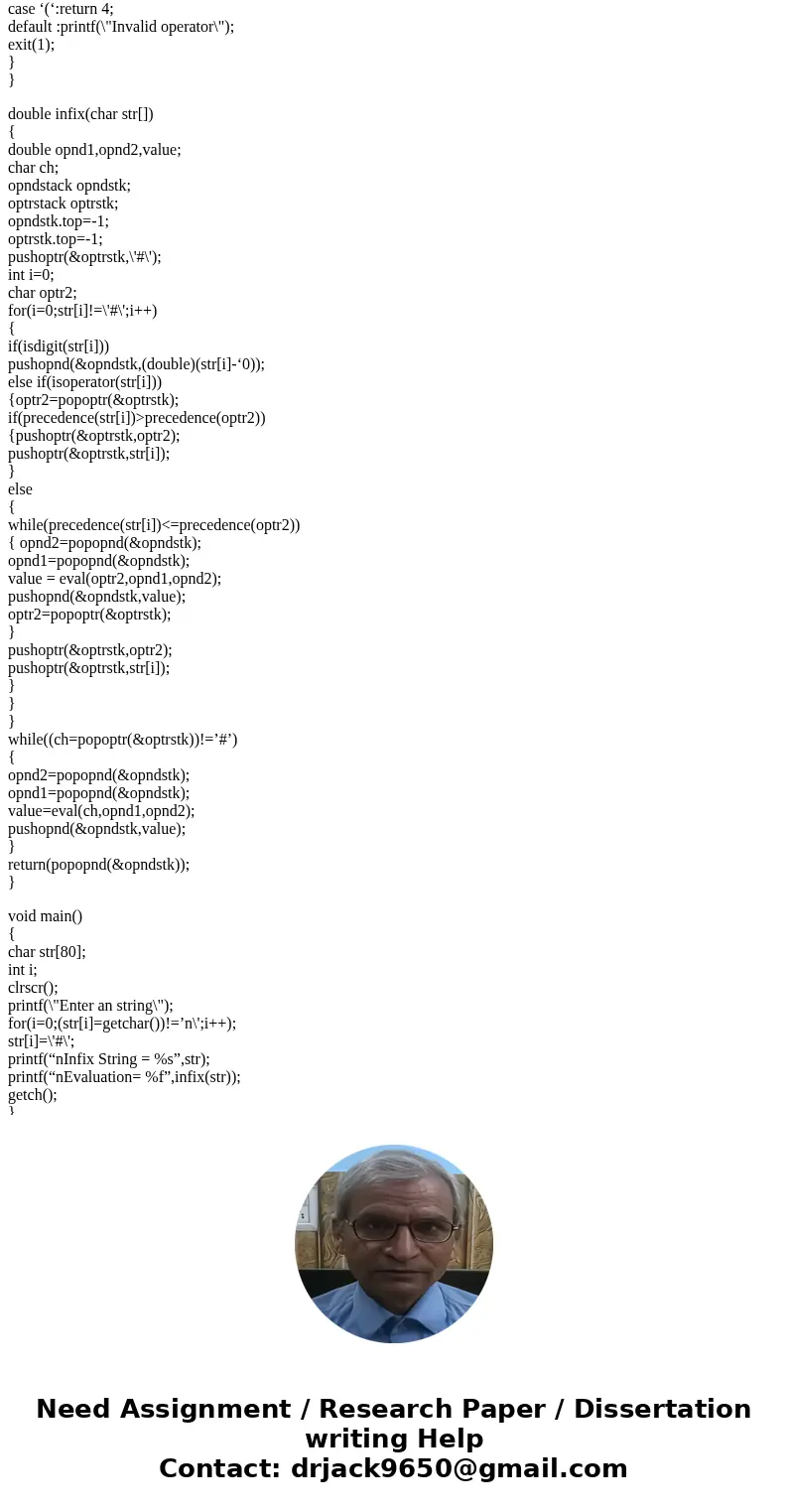
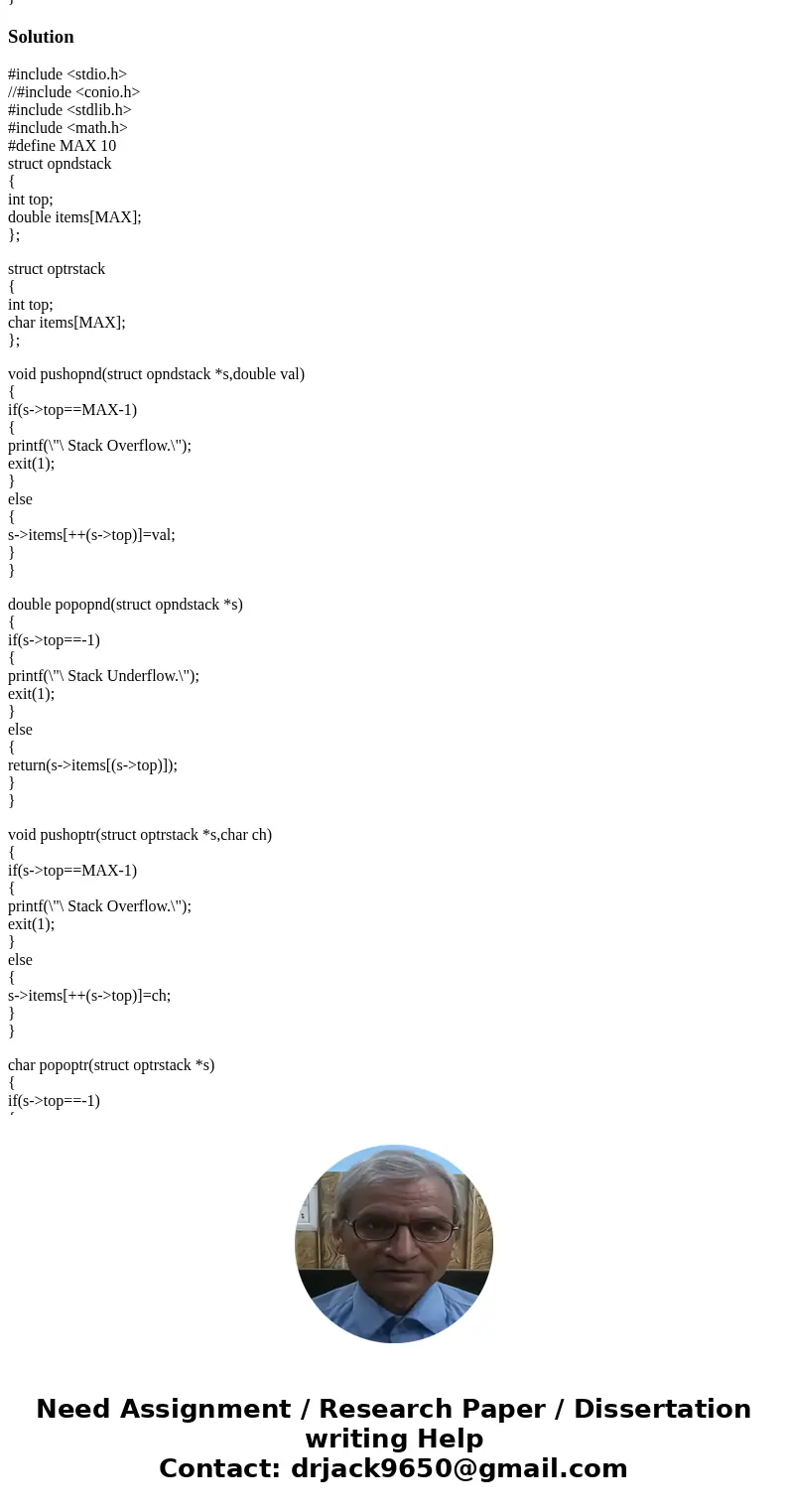
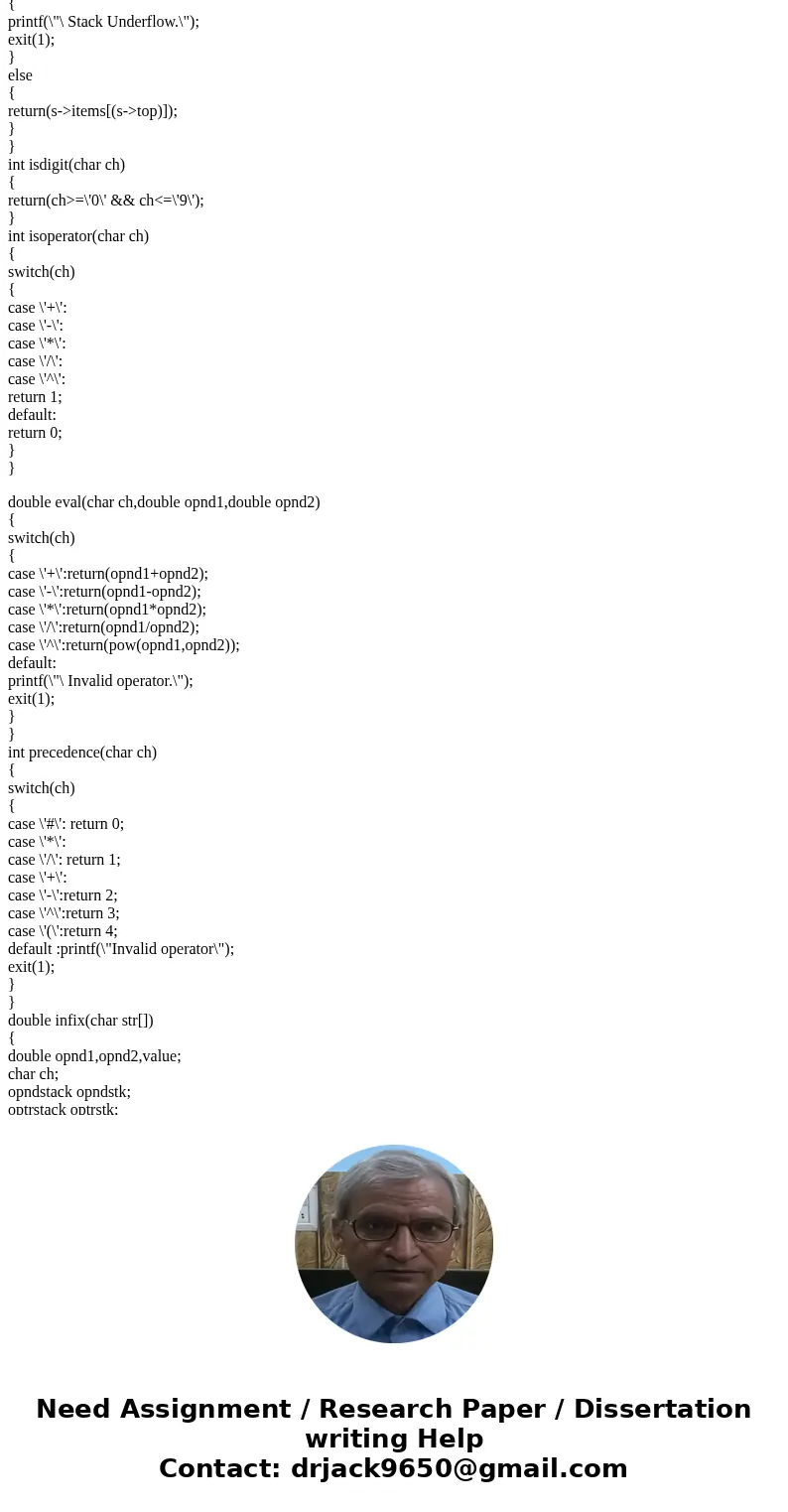
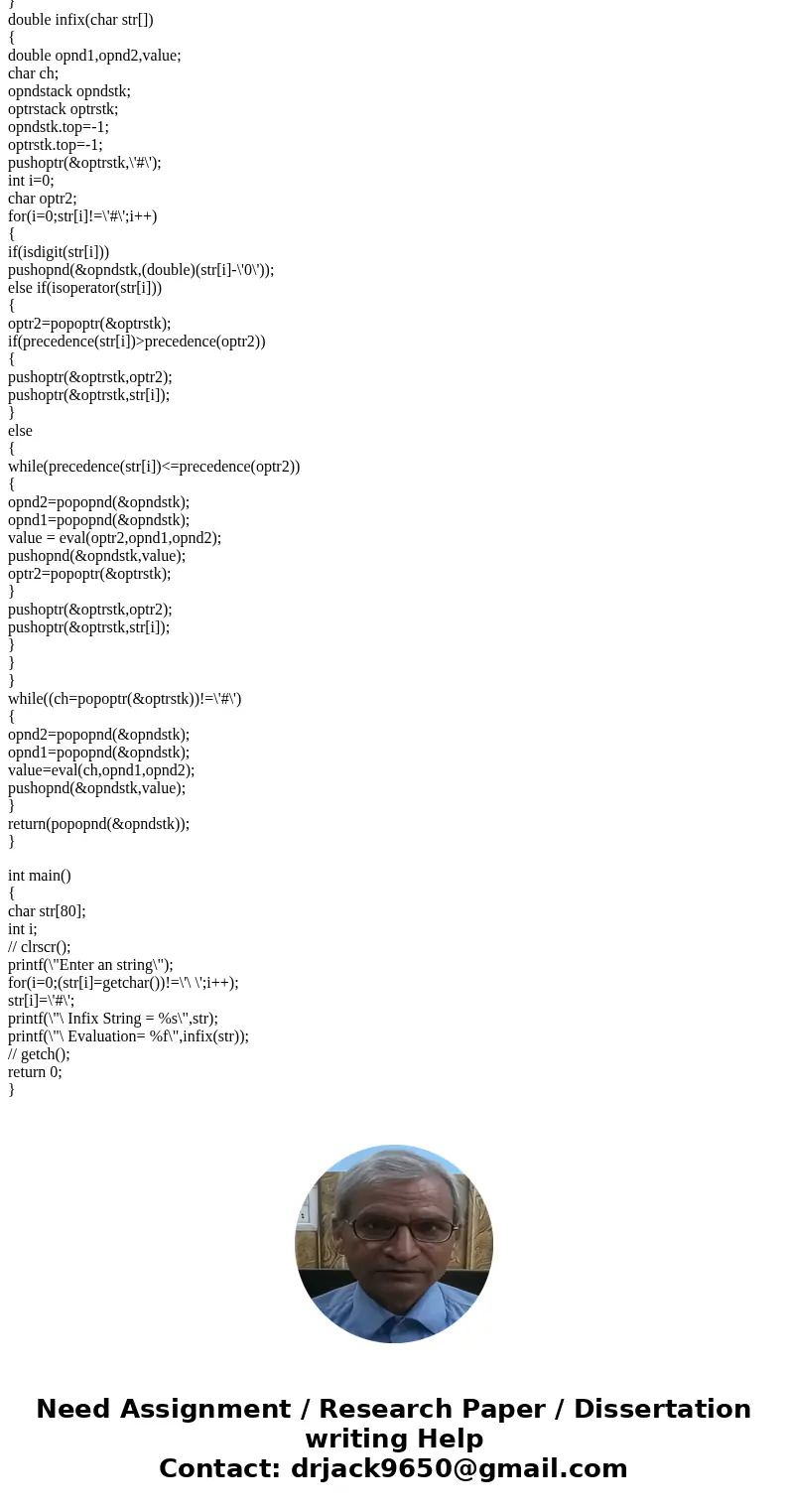
 Homework Sourse
Homework Sourse